
In some cases, the orthography of these words was later changed to reflect the Greek-and Latin-spelling: e.g., quire was respelled as choir in the 17th century. A large group of early borrowings, again transmitted first through Latin, then through various vernaculars, comes from Christian vocabulary:

A later Greek word, boútȳron ( βούτυρον), becomes Latin butyrum and eventually English butter. The word olive comes through the Romance from the Latin olīva, which in turn comes from the archaic Greek elaíwā ( ἐλαίϝᾱ). For instance, place was borrowed both by Old English and by French from Latin platea, itself borrowed from πλατεία (ὁδός), 'broad (street)' the Italian piazza and Spanish plaza have the same origin, and have been borrowed into English in parallel. In others, the phonetic and orthographic form has changed considerably. Some have remained very close to the Greek original, e.g., lamp (Latin lampas Greek λαμπάς). English often received these words from French. Some Greek words were borrowed into Latin and its descendants, the Romance languages. Since the living Greek and English languages were not in direct contact until modern times, borrowings were necessarily indirect, coming either through Latin (through texts or through French and other vernaculars), or from Ancient Greek texts, not the living spoken language. Of these, the neologisms are by far the most numerous.

vernacular borrowings, transmitted orally through Vulgar Latin directly into Old English, e.g., 'butter' ( butere, from Latin butyrum The Greek language has contributed to the English lexicon in five main ways: Without proper rendering support, you may see question marks, boxes, or other symbols. This article contains special characters.


 0 kommentar(er)
0 kommentar(er)
